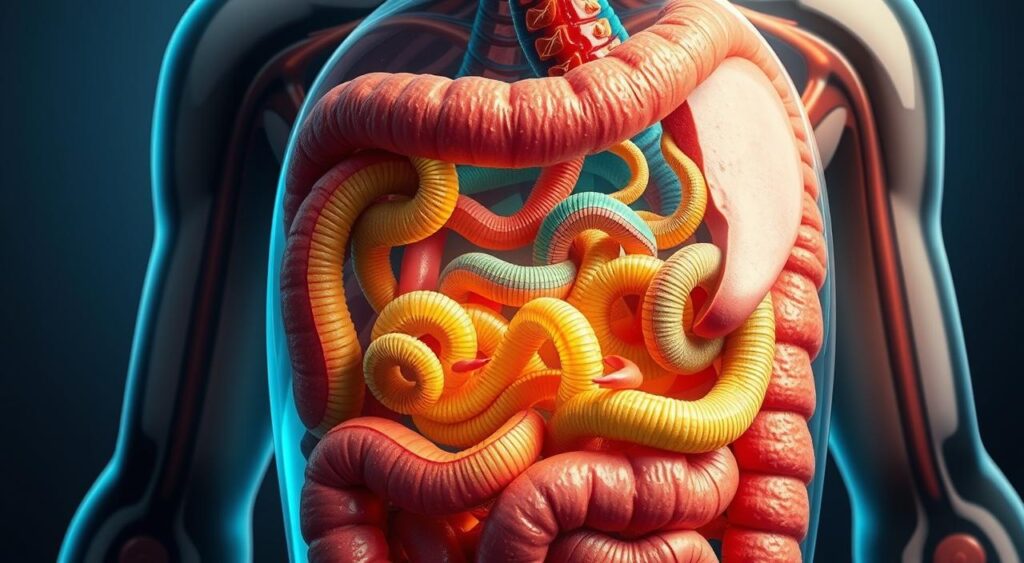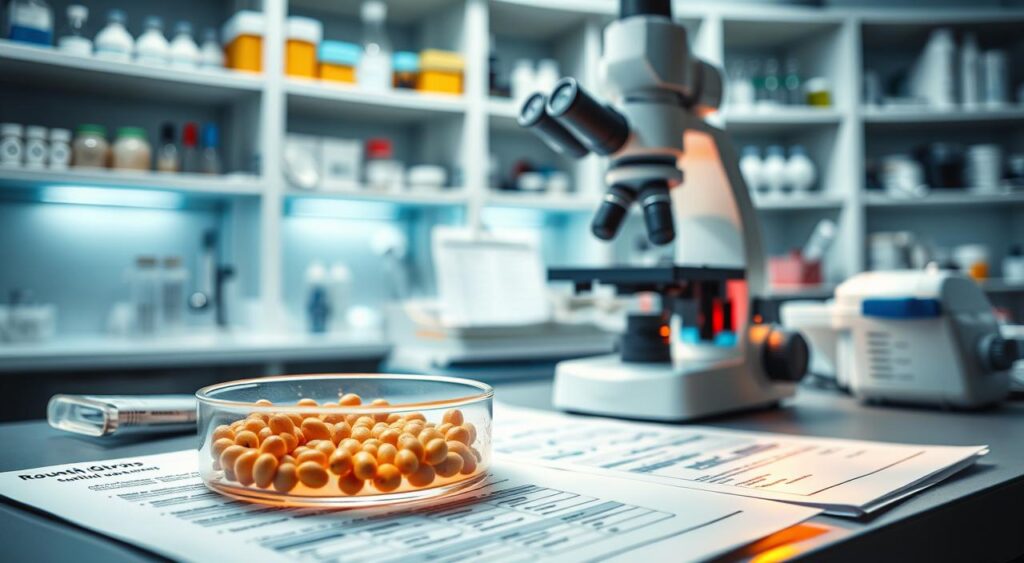Did you know that 1 billion people worldwide have roundworm? This nematode can lead to serious health problems. Anyone can get roundworm, no matter their age or where they live. It’s often caused by an intestinal parasite.
The main types of roundworms are ascariasis, hookworm, and trichinosis. These are all helminth infections.

Key Takeaways
- Roundworm infestations are a common parasitic infection that can affect anyone
- Roundworms are a type of nematode that can cause serious health issues
- Intestinal parasites, such as roundworms, can be caused by poor hygiene or contaminated food and water
- Helminth infections, including ascariasis, hookworm, and trichinosis, are types of roundworm infestations
- Understanding the risks and prevention methods is crucial to avoiding roundworm infestations
- Roundworm infestations can be treated with medication and prevented with proper hygiene and food safety practices
- It is essential to recognize the symptoms of roundworm infestations to seek medical attention promptly
Understanding Roundworm Infections
Roundworm infections are a big problem worldwide, affecting millions. These infections happen when parasitic worms like those causing ascariasis, hookworm, and trichinosis get into our bodies. Knowing about these worms and their health effects is key.
Many species of parasitic worms can cause roundworm infections. Ascaris lumbricoides leads to ascariasis, while Ancylostoma duodenale and Necator americanus cause hookworm. Trichinosis is caused by Trichinella spiralis.
What Are Roundworms?
Roundworms are parasitic worms that can infect us. They spread through contaminated food, water, or soil. Knowing their life cycle helps prevent and treat infections.
Common Types of Roundworms
Some common roundworms include:
- Ascariasis: caused by Ascaris lumbricoides
- Hookworm: caused by Ancylostoma duodenale and Necator americanus
- Trichinosis: caused by Trichinella spiralis
How Roundworms Affect the Human Body
Roundworm infections can be very harmful. If not treated, they can cause malnutrition, anemia, and more. If you have symptoms like abdominal pain, diarrhea, or weight loss, see a doctor.
To prevent roundworm infections, practice good hygiene, handle food safely, and know the risks. Understanding these infections helps protect ourselves and our communities from parasitic worms.
| Type of Roundworm | Cause | Symptoms |
|---|---|---|
| Ascariasis | Ascaris lumbricoides | Abdominal pain, diarrhea, weight loss |
| Hookworm | Ancylostoma duodenale and Necator americanus | Anemia, abdominal pain, diarrhea |
| Trichinosis | Trichinella spiralis | Fever, abdominal pain, diarrhea |
The Life Cycle of Roundworms
The roundworm life cycle is complex, with several stages from egg to adult. Knowing this cycle helps prevent and treat roundworm infections. Roundworms start when we eat or drink something contaminated with their eggs.
After we swallow the eggs, they turn into larvae in our intestines. These larvae then move to our lungs. There, they are coughed up and swallowed again, ending up back in the intestines where they grow into adult worms. This whole process can take weeks to months, depending on the type of roundworm.
- Egg stage: The eggs are ingested through contaminated food or water.
- Larval stage: The eggs hatch into larvae in the intestine.
- Migration stage: The larvae migrate to the lungs, where they are coughed up and swallowed.
- Adult stage: The larvae mature into adult worms in the intestine.
Understanding the nematode life cycle is key to stopping roundworm infections. By knowing how they infect us, we can stop their spread. This knowledge helps us find ways to prevent and treat these parasites.
| Stage | Description |
|---|---|
| Egg | The eggs are ingested through contaminated food or water. |
| Larva | The eggs hatch into larvae in the intestine. |
| Adult | The larvae mature into adult worms in the intestine. |
Common Sources of Roundworm Infections
Roundworm infections come from different sources. It’s key to know where these infections often start. Main sources include contaminated soil and water, food, and pets. Soil and water can have roundworm eggs or larvae. Touching them can lead to infection.
Eating undercooked or raw meat, especially pork, can also spread roundworms. Proper cooking and handling of food are important to stop this. Pets, especially dogs and cats, can also pass roundworms to people.
Sources of Infection
- Contaminated soil and water
- Food-borne transmission
- Pet-to-human transmission
Knowing where roundworm infections come from helps prevent them. By understanding these sources, people can stay safe. This includes keeping clean and cooking food right.
| Source of Infection | Description |
|---|---|
| Contaminated soil and water | Roundworm eggs or larvae can be ingested through contact with contaminated soil or water |
| Food-borne transmission | Undercooked or raw meat, especially pork, can contain roundworm eggs or larvae |
| Pet-to-human transmission | Infected pets, especially dogs and cats, can transmit roundworms to humans through contact |
Recognizing Roundworm Symptoms
Roundworm infections can cause a range of symptoms, from mild to severe. Common roundworm symptoms include abdominal pain, diarrhea, weight loss, and fatigue. In some cases, intestinal parasite symptoms can be more severe, leading to intestinal blockages, respiratory problems, and even death.
It is essential to recognize the symptoms of roundworm infections to seek medical attention and receive proper treatment. Some common symptoms of roundworm infections include:
- Abdominal pain and tenderness
- Diarrhea or constipation
- Weight loss and decreased appetite
- Fatigue and weakness
- Nausea and vomiting
If you are experiencing any of these symptoms, it is crucial to consult a healthcare professional for proper diagnosis and treatment.
In severe cases of roundworm infections, it is essential to seek medical attention immediately. With proper treatment, it is possible to eliminate the infection and prevent further complications. By recognizing the symptoms of roundworm infections, you can take the first step towards seeking medical attention and receiving the necessary treatment to recover from the infection.
High-Risk Groups for Roundworm Infections
Roundworm infections can happen to anyone. But some groups face a higher risk due to certain factors. It’s key to know who’s at risk to prevent infections and get medical help when needed.
Children are more likely to get roundworms because they play in dirt and water. Their bodies are still growing, making them more vulnerable.
Where you live also matters. Poor sanitation and dirty water increase the risk of getting roundworms. Occupational risks are another factor. People who work with animals or in farming are at higher risk because they often come into contact with contaminated soil.
- Children under the age of 5
- People living in areas with poor sanitation and lack of access to clean water
- Individuals working in farming, veterinary medicine, or other occupations that involve frequent contact with animals and contaminated soil
Knowing who’s at risk helps us take steps to avoid roundworm infections. By understanding the risks and taking precautions, we can fight against these infections. This way, we protect our health and the health of others.
Diagnosis Methods for Roundworm Infestations
Diagnosing roundworms often requires a physical check-up, a look at your medical history, and lab tests. Common tests include stool, blood, and imaging like X-rays or CT scans.
In some cases, a colonoscopy or endoscopy might be needed to confirm the diagnosis. Knowing how to diagnose roundworms is key to getting the right treatment and avoiding complications.
Here are some common ways to diagnose roundworms:
- Stool tests: to check for roundworm eggs or larvae
- Blood tests: to find antibodies or antigens related to roundworm infections
- Imaging tests: to see the intestines and check for blockages or damage

If you think you have roundworms, see a healthcare professional. They will do the needed tests and give you a proper diagnosis and treatment plan. By understanding how to diagnose roundworms, you can start recovering from an intestinal parasite diagnosis and prevent future infections.
| Diagnosis Method | Description |
|---|---|
| Stool tests | Check for the presence of roundworm eggs or larvae |
| Blood tests | Check for antibodies or antigens related to roundworm infections |
| Imaging tests | Visualize the intestines and check for any blockages or damage caused by roundworms |
Treatment Options and Medications
Roundworm treatment often includes prescription drugs like albendazole or mebendazole. These medications help get rid of the parasites in your body. It’s key to finish the whole treatment to avoid any problems.
The length of treatment depends on the type of roundworm and how bad the infection is. Sometimes, you might need to take the medicine more than once. It’s also important to manage any side effects, like nausea or stomach pain, to make sure the treatment works well.
Working closely with a healthcare provider is crucial. They will help figure out the best treatment plan for you.
Prescription Medications
- Albendazole: This medication is commonly used to treat roundworm infections and is typically taken for a period of 1-3 days.
- Mebendazole: This medication is also used to treat roundworm infections and is typically taken for a period of 1-3 days.
Treatment Duration
The time needed to treat roundworm infections varies. It can be a few days or several weeks. Always stick to the treatment plan to make sure you get rid of the infection completely.
Preventing Roundworm Infections
It’s key to stop roundworm infections to avoid their bad effects. Roundworm prevention means keeping clean, eating safe food, and controlling the environment. These actions help lower the chance of getting sick and keep you healthy.
Personal Hygiene Practices
Keeping clean is vital for preventing roundworm infections. Always wash your hands, especially after using the bathroom or before eating. Also, stay away from dirty soil or water to prevent getting infected.
Food Safety Measures
Safe food handling is crucial for roundworm prevention. Make sure to cook meat well and don’t eat raw or undercooked meat. Also, clean fruits and veggies well before eating them.
Environmental Control
Keeping the environment clean is also key for preventing roundworm infections. This means throwing away trash right and having access to clean water. These steps help lower your risk of getting sick and keep you healthy.

- Washing hands regularly
- Avoiding contact with contaminated soil or water
- Cooking meat thoroughly
- Washing fruits and vegetables thoroughly
- Proper waste disposal
- Access to clean water
Complications of Untreated Infections
Untreated roundworm infections can cause serious roundworm complications. These include intestinal blockages, respiratory issues, and even death. In severe cases, they can lead to malnutrition, weight loss, and fatigue. It’s crucial to know the risks of untreated roundworm infections to get medical help and treatment.
Some common complications of roundworm infections are:
- Intestinal blockages: Roundworms can build up in the intestines. This causes severe abdominal pain, vomiting, and constipation.
- Respiratory problems: Roundworms can move to the lungs. This leads to coughing, wheezing, and shortness of breath.
- Malnutrition: Roundworm infections can prevent the body from absorbing nutrients. This results in malnutrition, weight loss, and fatigue.
Research shows that roundworm complications can be severe and even deadly if not treated. It’s important to see a doctor if symptoms get worse or don’t go away. Early treatment can prevent untreated roundworm infections and their complications.
In conclusion, knowing the risks of untreated roundworm infections is key to getting medical help and treatment. By understanding the symptoms and risks, people can take steps to avoid roundworm complications and stay healthy.
Global Impact of Roundworm Disease
Roundworm disease is a big problem worldwide, affecting millions. Over 1 billion people have roundworms. The economic burden is huge, with billions lost each year.
Studies show roundworm disease’s impact varies by region. But it’s clear it’s a big deal, especially in poor countries. Some important facts include:
- Over 1 billion people are infected with roundworms worldwide.
- The economic burden of roundworm disease is estimated to be in the billions of dollars each year.
- Roundworm disease is a major public health concern, particularly in developing countries.
Preventing roundworm disease is key. Public health efforts like education are crucial. By understanding the issue, we can fight it better. The global impact of roundworms is a big worry, and we must act.
The World Health Organization (WHO) says roundworm disease is common. The WHO believes over 800 million people have it. This causes a lot of sickness and death. We must work to reduce infections and lessen the disease’s economic impact.
| Region | Number of People Infected | Economic Burden |
|---|---|---|
| Asia | 500 million | $10 billion |
| Africa | 300 million | $5 billion |
| Latin America | 200 million | $3 billion |
Conclusion: Taking Control of Roundworm Prevention
The fight against roundworms needs a strong plan that helps us take charge of our health. Knowing the risks and using roundworm prevention methods can greatly lower the impact of these parasites. Keeping clean, safe food, and a tidy space are key steps.
Taking control of roundworms is important for our health and the health of others. By working together and staying alert, we can stop roundworm diseases from spreading. This helps keep children and others safe from harm. With ongoing research and education, we can make our world safer from roundworms.
Knowing how to prevent roundworms gives us the power to protect our communities. By being informed and active, we all help make our world healthier. Together, we can beat the roundworm problem and look forward to a future free from parasites.
FAQ
Q: What are roundworms?
A: Roundworms are parasitic worms that can infect humans. The most common types are ascariasis, hookworm, and trichinosis.
Q: How do roundworms affect the human body?
A: Roundworms can cause health issues like abdominal pain and diarrhea. They can also lead to weight loss and fatigue. In severe cases, they can cause intestinal blockages and even death.
Q: How are roundworm infections transmitted?
A: Roundworm infections spread through contaminated soil and water. They can also spread through food and from pets to humans. Keeping clean and safe is key to preventing these infections.
Q: What are the common symptoms of roundworm infections?
A: Symptoms include abdominal pain, diarrhea, and weight loss. Recognizing these symptoms is important for getting medical help.
Q: Who is at a higher risk of contracting roundworm infections?
A: Children and people in areas with poor sanitation are at higher risk. So are those working in farming or veterinary medicine.
Q: How are roundworm infestations diagnosed?
A: Doctors use physical exams, medical history, and tests like stool and blood tests. Imaging tests may also be used.
Q: What are the treatment options for roundworm infestations?
A: Treatment usually involves prescription medications like albendazole or mebendazole. The treatment length depends on the type of roundworm and the infection’s severity.
Q: How can roundworm infections be prevented?
A: Preventing infections means practicing good hygiene and following food safety. This includes washing hands, cooking meat well, and keeping environments clean.
Q: What are the complications of untreated roundworm infections?
A: Untreated infections can cause serious problems like intestinal blockages and malnutrition. Seeking medical help is crucial to avoid these issues.
Q: What is the global impact of roundworm disease?
A: Roundworm disease affects millions worldwide each year. It also has a big economic impact. Global health efforts are needed to control it.
